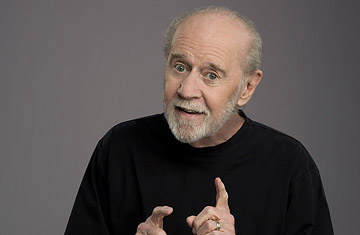
George Carlin
They say death is a good career move, but for George Carlin it has been more like a career rediscovery.
For all the encomiums that followed his passing last June, of a heart attack at age 71, what has been conveniently missed is the fact that, for the past few years of his life, the entertainment world didn't pay much attention to George Carlin. Unlike his great contemporary Richard Pryor — whose slow decline from multiple sclerosis prompted years of tributes and early eulogies, before his death in December 2005 — Carlin had the bad form to keep working to the very end, maintaining a nearly full schedule of concert appearances, drawing crowds of devoted (mostly baby-boomer) fans, continuing to come up with edgy, often reckless, occasionally brilliant material. Other stand-up stars, like Pryor or Jerry Seinfeld, didn't win their greatest acclaim until they graduated to movies or TV series; Carlin remained, resolutely, "just" a stand-up comedian — one, moreover, whose long hair and hipster attitude came to seem increasingly dated. (Read TIME's 2004 "10 Questions For George Carlin".)
But a surprising, and wonderful, thing happened after Carlin's death. The outpouring of praise from his comedy peers, and a bounty of clips from his nearly 50 years of stand-up, amounted to more than just the obligatory Hollywood sendoff for another departed star. They actually helped make the case for Carlin's immense importance in the world of comedy, a case never made during his lifetime. And so, the ceremony in which Carlin was posthumously awarded the annual Mark Twain Prize in American Humor — taped last November at the Kennedy Center, and airing on PBS on Wednesday, Feb. 4, at 9 p.m. E.T. — brings the cycle of tributes to an especially satisfying conclusion.
Maybe it took the absence of the guest of honor to drain the show of the usual sentiment, Hollywood gush or Friar's Club japery that lards so many of these black-tie events. The comics who trooped on the stage to praise Carlin seemed to work especially hard to explain — to themselves perhaps as much as to the rest of us — just what made him such a crucial role model for a generation of comedians that followed.
Bill Maher says Carlin was the comic who "inspired me to think I could do things differently." Richard Belzer marvels over the "precision" of his technique. Lewis Black, perhaps Carlin's most obvious heir as an angry social satirist, says he "raised the level of our craft." Garry Shandling recalls how, as a young student at the University of Arizona, he accosted Carlin before a club date, showed him some jokes he had written, and got the encouragement that prompted him to get into comedy. After showing the full-length clip of Carlin's "Ode to a Modern Man," his late-career masterpiece in which he boils every 21st century buzzword into a dazzling three-minute rant ("I've been uplinked and downloaded; I've been inputted and outsourced: I know the upside of downsizing, I know the downside of upgrading...."), Jon Stewart simply shakes his head in something close to awe: "Just the most amazing mind, that man had."
The clips are exceptionally well chosen. For the uninitiated, there's the famous "seven dirty words" routine (the seven still bleeped, of course), and his still audacious routines on religion and death. But there are also generous helpings of early bits from his short-hair days (cracking up Johnny Carson with his Hippy Dippy Weatherman) and rareties like Carlin sitting at the piano on Arsenio Hall's show, accompanying himself in a rendition of "Cherry Pie" — as well as a generous helping of his playful but pointed riffs on language, like his account of the progress of military jargon from "shell shock" to "battle fatigue" to "post-traumatic stress disorder."
As a satirist of the social uses and misuses of language, Carlin might have had fun with these cliché-ridden TV lovefests too. But he would have had a tough time putting down this one. It's the heartfelt but hard-headed tribute he always deserved.
Richard Zoglin's book, Comedy at the Edge: How Stand-up in the 1970s Changed America, has just been published in paperback.
